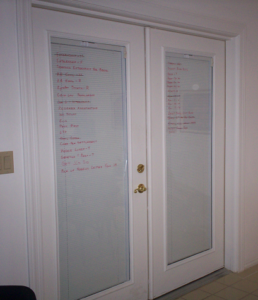Disclaimer: I am not a lawyer. This blog should not be viewed as legal advice. It is simply my experiences, opinions, and information I looked up on the internet.
A few months ago, a friend sent me an article about yarn bombing. It involves knitting or crocheting covers for public statues and sign posts. It looks so whimsical and charming! It looks like the best way to do it is to measure the item you want to yarn bomb, determine how many pieces it will take to cover the item, make the items, then go back to it and stitch the pieces around it to give it a snug fit. At first, I thought this would be something that could only happen under the cover of night, but I was pleased to see pictures of yarn bombing happening during the day time.
I have been crocheting for over 10 years. When I heard about yard bombing, I immediately wanted to grab my tape measure and run downtown to start measuring things to yarn bomb. I think it would be so much fun to drive down the street and see the post for every sign covered with colorful yarn. My next thought, of course, was whether yarn bombing was legal.
Is It Trespassing?
It depends. If what you want to yarn bomb is on public property, like a sign post on a street corner or a statue in park, it’s not trespassing to walk up to it. If you want to yarn bomb a statue or monument, there might be a sign posted on or near it that says, “Do Not Touch†or “Do Not Climb.â€Â If what you want to yarn bomb is on private property, such as a lawn jockey in front of someone’s house, it’s trespassing to go onto their property without an invitation. On the flip side, if the person who owns the private property likes what you did, it’s more likely to stay up longer than yarn bombing on public property.

Is It Vandalism?
I doubt it. When I think of vandalism, I think about graffiti spray painted on walls. To get rid of it, you have to power wash it and repaint the wall. Yarn bombing is less destructive and completely non-permanent. I would argue that it is not even defacing property but rather a type of unsolicited public art, like artists who draw with chalk on the sidewalk.  Yarn bombing art can be removed in minutes with a pair of scissors. I’d say, at most, it’s more like littering than vandalism. Regardless of what you call it, I doubt the police would waste their time tracking down and citing a yarn bomber as long as they didn’t create any type of public hazard.
Related articles
- Yarn bombing in Texas (helenmccarthy.wordpress.com)
- Story Behind that Yarn Street Art (mymodernmet.com)
- Rogue knitters’ handiwork appears in Cincinnati (dispatch.com)
- Yarn Bombers Dress Up Vancouver for Mini Maker Faire (craftzine.com)
- How I Spent Yarn Bombing Day (croshame.com)






